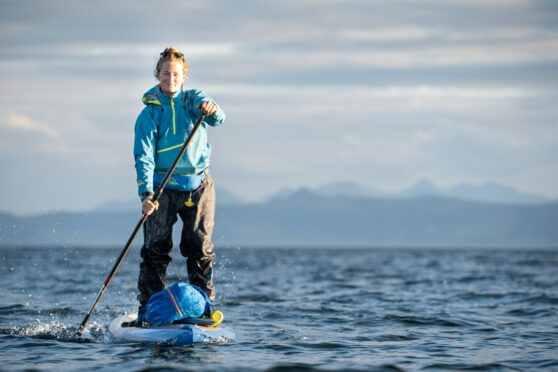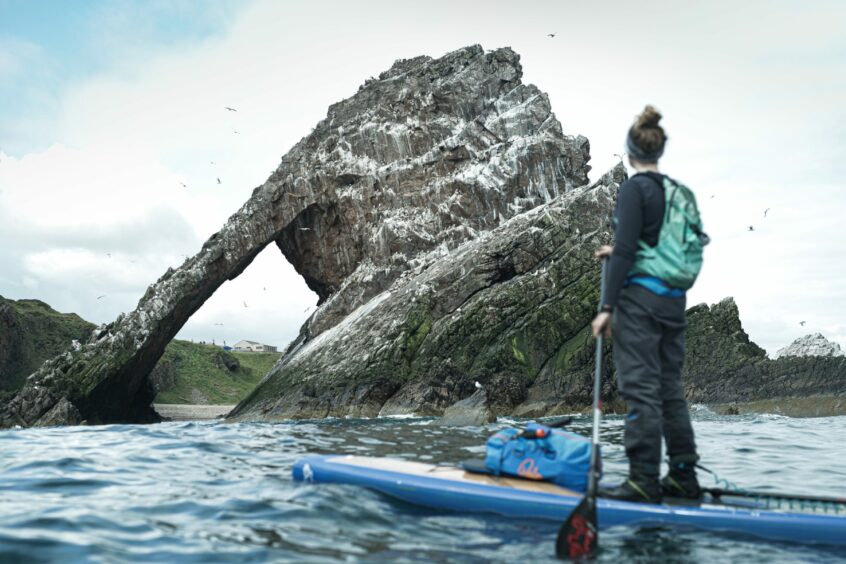
A committed environmentalist aware of the peril facing our oceans, Cal Major thought she had seen it all. After paddling around Scotland, she admits the risk to our seas is far, far greater than she feared.
The vet and adventurer, who became the first person to stand-up paddleboard the length of the UK in 2018, spent 10 weeks exploring 800 miles of Scottish coastlines and struggled to comprehend the levels of pollution and waste she encountered.
“I’ve spent a lot of time in really remote beaches cleaning them and highlighting the waste. Some of the beaches on the west coast of Scotland are piled with rubbish, and when I paddled round Skye in the past I found a cow chewing a fishing net. I’ve also come across turtles wrapped up in fishing nets,” she said.
“I felt I’d seen the extent to which marine litter is damaging the environment but this trip blew all of that out of the water. On the tiny, remote islands of the Summer Isles, I came across massive, long feeding pipes from the fish farming industry and waded through plastic.
“There were two instances that brought it home for me. The first was coming across a baby humpback whale floating dead on the surface with creel pots wrapped around its tail, presumably dead from drowning. I’d never seen a humpback whale out in the wild before and the first one I came across was a dead baby.
“A few days after that, I came across a gannet – still alive but completely entangled in fishing line and with barbed hooks through its tail and feet. I managed to disentangle it, but looking at the gannet colony at Troup Head, there were loads with plastic or rope wrapped around their legs and beaks, which I couldn’t do anything about.”
Major spoke to those living near the coastlines and who work on the seas during her trip – which she has turned into a three-part documentary, Scotland: Ocean Nation, launching on STV Player today – and discovered there isn’t a simple solution to the problem, but it is one everybody has a part in tackling.
“It’s a pervasive issue and we all have a responsibility for it. On the west coast, there was a lot of fishing gear but also a lot of single-use plastic household items; a real mixture of what’s being found in the sea. What we wanted to get across is there isn’t a one-size-fits-all answer and just placing the blame on the fishing industry as a whole isn’t helpful.
“There are so many nuances, and so many different types of fishing. Certain types create this entanglement which is visible and easy to shame, but other types of fishing have their own ways of damaging the sea that we aren’t seeing, so what is important is trying to help people see what’s out of sight and out of mind, and what can be done to tackle it, rather than just laying blame.”
Major is pleased to see steps being taken to protect our oceans but believes progress needs to move faster. She is happy not only about the signing earlier this month of the High Seas Treaty, which aims to place 30% of the world’s seas into protected areas by 2030 to safeguard and recuperate marine nature, but, closer to home, the Scottish Government’s public consultation on the Highly Protected Marine Areas.
“The consultation is open until April 17 and is all about designating 10% of Scotland’s seas as highly protected areas, which would massively limit the amount of destructive human activity that happens there, and it would have a spill-over effect into neighbouring areas,” Major continued. “So it’s about making healthier seas in general around Scotland.
“I think one of the main motivations for me making this new film is that people haven’t seen what’s underwater and don’t know what is happening in the seas, so we wanted to highlight that and show why people should care. At the moment, the sea and looking after the sea is thought of as a place for a select few people who personally interact with it, but that’s not the case at all – we all have the right to stand up for it and the responsibility to look after it because it affects all of our lives.
“We wanted to demonstrate that the ocean has a massive role in the climate crisis. We often hear about reducing carbon emissions, decarbonising societies and planting more trees on land, but seagrass absorbs 35 times more carbon than terrestrial forests, kelp forests absorb carbon 20 times faster than the equivalent terrestrial biomass, and the ocean holds 25% of the carbon we’ve already produced and has this role of producing the oxygen we breath. But it’s not protected like our lives depend on it, yet all of our lives do depend on a healthy ocean, so to understand that and put the correct protective measures in place is really important.
“More needs to be done and done fast. Last week, the latest Intergovernmental Panel on Climate Change report came out. This is a report done every six years or so and talks about the state of the climate and what needs to be done. This latest report said we still have time to act and limit global warming, but it has to be all hands on deck and right now.”
Major did the trip in 2021 but has been back to some of the areas she visited since, and says the waste is still there.
“It can’t come down to the local communities to do the work, it has to come from policy as well, so I think there’s a huge role for the government to play in making sure this isn’t happening in the first place, and for those who are polluting to be held responsible.”
Scotland: Ocean Nation is available to stream now for free on STV Player

Enjoy the convenience of having The Sunday Post delivered as a digital ePaper straight to your smartphone, tablet or computer.
Subscribe for only £5.49 a month and enjoy all the benefits of the printed paper as a digital replica.
Subscribe